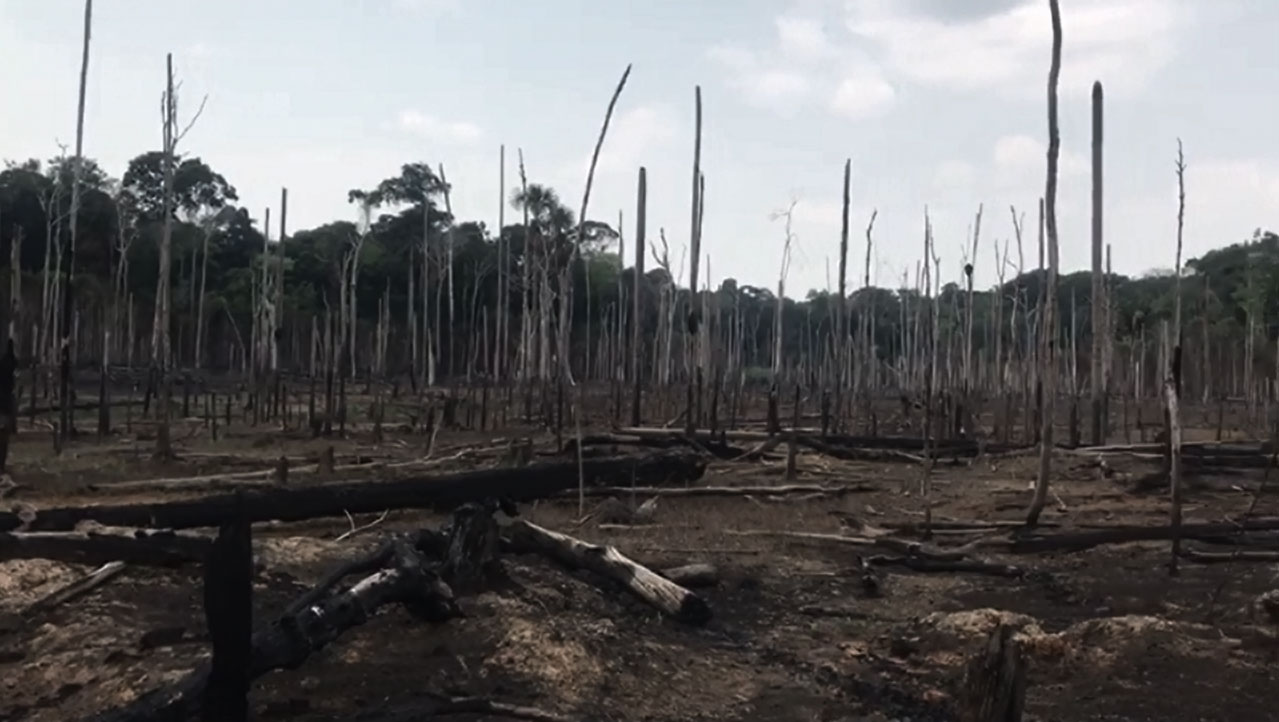By Brian Mier
I arrived in Porto Velho yesterday and could see plumes of smoke billowing in the distance as the plane descended into city which, in itself, is covered in smoky haze. We grabbed a taxi in from the airport and the driver told us that he doesn’t understand why there are so many media people here. “This happens every year in dry season and nobody from the media ever shows up,” he told us. “The only difference is that the climate is changing so dry season started early. It has been more smoky than usual though but I don’t understand what the big deal is.”
In this state, ruled over by governor Marcos Rocha, a former Military Police Colonel from Rio de Janeiro serving his first term in public office for Jair Bolsonaro’s PSL party, the general population does not seem to be rising up in revolt against the government. 71% of the residents voted for Bolsonaro in the last election, and last night’s protest only had a few hundred people in it.
But this complicity with the smoke masks what is really going on in the state. Luciana Oliveira is a local journalist whose reporting has been completely blacked out in the local media who spent yesterday filming fire inside of a huge indigenous reserve where an association of cattle ranchers has come in, marked the forest into lots and started burning it down for pasture. She told me that according to the fire department, forest fires in the 6 Rondonia counties were the most deforestation is going on are up by 193% this year.
“We warned everyone that this was going to happen,” she said. “we said that President Bolsonaro’s rhetoric would pull a mental trigger. He gave the order when he relativized the issue of environmental crimes, when he discredited the work of the environmental protection agencies, and when he ridiculed the fines, he gave an order. He said, ‘do it.’”
I met her along with a liberation theology priest whose been working with indigenous people for 40 years. “This kind of thing has been going on the entire time,” he said, “but it’s worse than ever now. There is a reserve I work in where the deforestation is going out of control. There are hundreds of different tribes around here but in this reservation there were two very remote tribes that had almost no contact with outsiders and they seem to have just disappeared. Nobody knows what happened to them. I think they might have just killed them all.”
Rondonia was the first state in the Amazon region where the modern Brazilian government made a conscious, systematic plan for deforestation. In the late 1970s, the World Bank convinced the military dictatorship that deforestation was good for the economy and financed a project called “Polo Norte” in which thousands of ranchers were subsidized to move into the state and create pastures to raise cattle for beef exports to the US and Europe. The ranchers took over the state political apparatus and have controlled it ever since, in contrast with neighboring Acre and Amazonas, which both still have over 95% virgin forest cover and, especially in the case of Acre, green economies in which extractivist products such as Brazil nut, rubber and açai generate billions of dollar a year. Rondonia has been so devastated that the only large areas of forest remaining are on the Indigenous reservations and this is what is being burned now, in a scenario in which the bureau of indigenous affairs and the environmental protection agency have been gutted by the Bolsonaro government. And now they are moving into Amazonas, which has declared a state of emergency due to the fires. As of 2018 Amazonas was still 98% virgin rainforest but now an area has opened up in the south of the state, centered around the highway towns of Humaitá and Apui, called the “band of fire”, where ranchers and soy farmers have opened up huge swaths of land and fires are currently burning out of control. In 2017 in Humaitá, ranchers attacked the local environmental protection agency office and lit it on fire, torching two of their vehicles. They seem to know a lot about fire.
[qpp]

